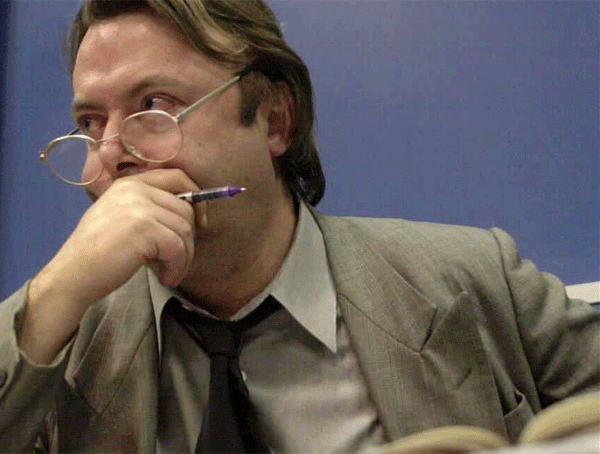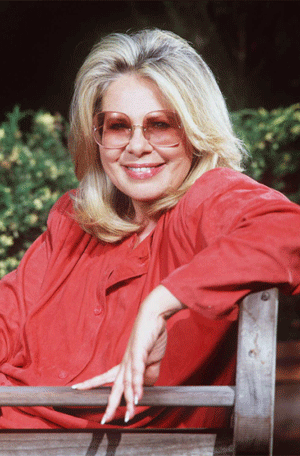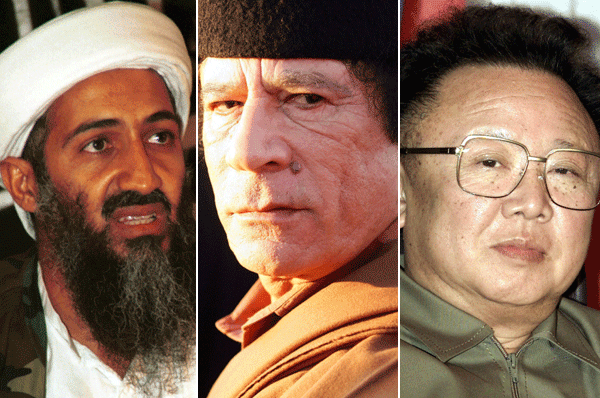In Memoriam

By Amy Wilentz
I’d been working as a lowly scrub at the Nation in New York when, in 1979, I was asked to track down
I was a convincing emissary, because from the minute I met Christopher, all I could think of was how I had to get him to work in New York, since I couldn’t live without him. He seemed to me then like a mature step-up from Beatle worship; he was a heady mix of
He did come to America, thank God (oh, oops).
And although at the time he was an object of adoration, what he really became was my mentor. Admittedly, he was an odd bird for a love object. This was a man who even in his late 20s could not wear blue jeans so that they looked normal. His clothing was eccentric and threadbare and ill-fitting. His hair was unkempt and his teeth were tobacco stained. He drank way too much. He characterized his general state of affairs as damp and always, at first meeting, asked How do I look?
So why did I adore him?
Because he knew everything, and I knew nothing. Because he gave me words that became a part of how I talk (for instance, rug rethink for haircut; development for pimple or blemish). Because he was good at hating, condescending, despising all things that I did not know how to do. Because his idea of an appropriate seduction scenario was to go out to eat with a girl (preferably one who picked up the tab) and recite An Irish Airman Foresees His Death to her over dessert. (Later, he told me this MO had a success rate that hovered around 96%.)
And because he opened my eyes to new ways of seeing things, even if I didn’t always agree.
I still remember walking down 13th Street in New York one year on Nov. 22 and telling him about how my mother had come to pick me up at school on the day
He laughed. I looked at him.
When we heard JFK had been killed, he said, we drank champagne. For me, this was one of those moments of political revelation. I simply hadn’t imagined up to then that anyone I respected could have rejoiced at Kennedy’s death.
When
But of course his mother had ended up dead from all that romance, and as he got older, the sturdy, British character of his father, a former naval commander known to all Christopher’s friends as the Commander, began to assert itself in Christopher’s personality.
This was the side of him that, again, to my political shock, supported the queen (to say nothing of Margaret Thatcher, then reviled by all good left-leaning Britons) in the matter of the Falkland Islands. I remember him gathering himself up grandly in the Cafe Loup near the Nation (a bistro he referred to as simply, the Loo) and telling me he would happily serve on one of her majesty’s ships that were at that moment steaming toward the waters off Argentina to keep the sheep and shepherds safely under British rule. Christopher turned out to be a patriot. Weird.
It was also the influence of the Commander’s character, I suspect, that led Christopher into his final ill-tempered support of the
He was a natural mentor, though he never tried to be one. I remember once sitting in his office in the early 1980s and watching him write on one of the Nation’s ancient manual typewriters, his cigarette dropping ash. I was whining about the fact that the magazine’s editor, Victor Navasky, never asked me to write anything.
Why should he? Christopher asked as he typed. Have you ever put anything on his desk and said: Publish this’?
I admitted I hadn’t.
Well, don’t wait around for him to ask you. Just do it. And so I did, a month later, and Victor published it, to my shock. It was a very early piece on the rise of the right-wing French politician
I last saw Christopher on the day after Valentine’s Day this year when he was visiting L.A. We had lunch at his hotel. He was in a good mood after having almost died a few weeks before, from one of his treatments. He had a glass of wine, maybe two. We talked in a desultory way about old friends; it was a very retrospective conversation, even for Christopher, who always enjoyed dwelling on the past. He was matter-of-fact about his illness.
I left him sitting on a bench outside the hotel’s lobby. There was no sloppy farewell, although we both knew this might be the last time we’d see each other. I pulled out in my car a few minutes later, unseen by him. He was still sitting there alone on that bench, hat on head, cigarette in mouth, notebook on lap. As I passed, he lit his cigarette, and just sat there, gazing out at the parking lot and the stalled freeway traffic beyond.
Amy Wilentz’s most recent book is The Rainy Season: Haiti Then and Now.
Above, Hitchens is seen in 2001. (Bill Tiernan / AP Photo)

By
On Monday, Sept. 13, 2007, I got a call from my agent that would start an unlikely friendship. He said: Sue Mengers wants to invite you to dinner. She heard about your Emmy acceptance speech.
I knew exactly who she was. I remember seeing pictures of her with
I chose a Chanel cocktail dress. I was told not to bring anyone. Part of Sue’s game was that she’d never say who else was going to be at her parties, so when I got there alone I found
Sue had everyone sit around her coffee table. She brought up my reality series, My Life on the D-List. She told the group: It is so funny. I sit in bed and watch her and she improvises everything. And she turned to me and said: Horrible title. You never should’ve called it D-list. Awful. I thought, What?
At the circular dining room table, Sue introduced me in a very grand way by saying, Any woman who would go to the Emmys and tell Jesus to suck it’ deserves a seat at my table.
A seat at my table. That meant so much to me. Typically, I get in trouble for what I say. And I was in trouble at that time. I had religious groups mad at me, the television academy, various celebrities and so on. But if I hadn’t told Jesus off, I wouldn’t have met Sue, a ballsy chick who really put that kind of bravery into action.
I watched her all night. I couldn’t take my eyes off of her. All the men there truly as gruff and tough as it gets deferred to her. She would make sweeping, provocative statements like
Lucky for me, it wasn’t my last time at her table. But one night I went to a Sue dinner, and the next night I was a guest on
I heard from Sue. Quickly. She was upset. Upset that I’d even mentioned the dinner. There were unspoken rules: No asking for photos. No ego-stroking among guests. No acknowledging that you knew each other’s work.
It was kind of like a Fight Club; you never talked about it. It was a bizarre celebrity A-list bubble. But it was Sue’s, and she thought I’d burst it.
Sue said: I think you should apologize to the people at that table. I said: Sue, I love that you think I have any one of their telephone numbers.
I leveled with her: Look, you can’t put a gag order on me. The reason you invited me was because I stood up to Jesus at the freaking Emmys.
But I definitely felt terrible. I didn’t know where we stood. Then one night, two weeks later, she called me and invited me to the next dinner. I couldn’t go; I was on the road. I regret it deeply.
I was in a diner the Sunday I heard she died. I don’t think she knew the effect she had on me. She was a formidable and vulnerable woman. She held court; she valued the art of conversation. And if you’re wondering why all the A-Listers wanted to be in her presence years after she retired as an agent, it’s because she didn’t need anything from them. How’s that for a life lesson?
Kathy Griffin is a two-time Emmy winner and the author of Official Book Club Selection: A Memoir According to Kathy Griffin.
Above, Mengers is seen in 1996.
RELATED: Kathy Griffin shares another story about Sue Mengers (Marsha T. Gorman / Los Angeles Times)

By Doyle McManus
It was a bad year for the villains of the world.
Three of the biggest bad guys met their ends:
Bin Laden was the most important. Americans remember him, of course, as the architect of the terrorist attacks of Sept. 11. But his larger achievement was in organizing
But by the time the Navy caught up with Bin Laden, relentless U.S. attacks had reduced the core of Al Qaeda to only a few high-value targets, most of them in hiding. True, the organization had atomized successfully into franchise operations in Yemen, Somalia and North Africa, but the local groups quickly got caught up in local politics and lost their focus on attacks against the U.S. That caused distress to the founder, who sent letters urging his affiliates to get back to killing Americans. With Bin Laden gone, Al Qaeda isn’t over, but it’s a much smaller threat to us now.
The second of the three despots who left us in 2011 Kadafi was known by the end of his career more for his flamboyantly theatrical uniforms and his onetime crush on
The dictator met his end because of a bigger trend, the wave of democratic enthusiasm sweeping the Arab world. Libyans saw autocrats fall in two neighboring countries, Egypt and Tunisia, and decided they could change their circumstances too. Even with considerable help from NATO, it took the rebels six months to take the capital of Tripoli, and two more to capture Kadafi. His end was ugly and ignominious; he appears to have been tortured and shot by the insurgents who found him.
Kim Jong Il, by contrast, died without violence at the end of a 16-year reign over the world’s last hermetically-sealed communist dictatorship, a regime that ruined its own economy but protected itself with nuclear weapons and an alliance with neighboring China.
By the narrowest standard of authoritarian regimes, self-preservation, Kim’s tenure was a success. He passed power on to his 28-year-old son,
But the stability may be illusory. The North Korean dynasty’s first leader, Kim Il Sung, was proclaimed Great Leader, and Kim Jong Il was known as Dear Leader. But young Kim Jong Un has been named only the Great Successor a title that, by comparison, feels a little tentative.
Kim Jong Il’s death was peaceful, but it was a warning its own way: Even the best-managed tyranny can’t escape the limits of biology. The North Korean regime won’t last forever, any more than its leader could.
Are there any villains left to loathe or fear? Plenty, alas. Kim Jong Un and his relatives don’t look like much of an improvement on Kim Jong Il. Syria is still ruled by
But they read the obituaries too. They know that they won’t be around forever, and that if they play their cards badly, their ends could be unpleasant.
In 2012, the world’s tyrants and dictators are sleeping a little less comfortably than they did a year ago. And that, in its own way, is good news.
[email protected] (Mazhar Ali Khan/AP Photo, Pascal Le Segretain/Getty Images, Alexander Zemlianichenko/AP Photo)



